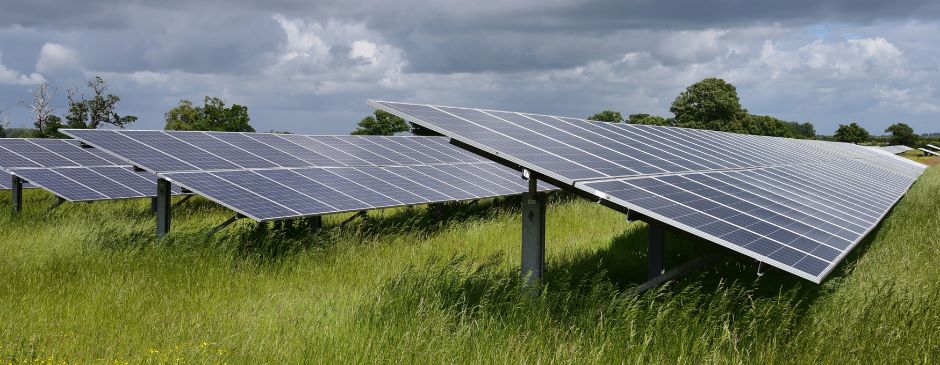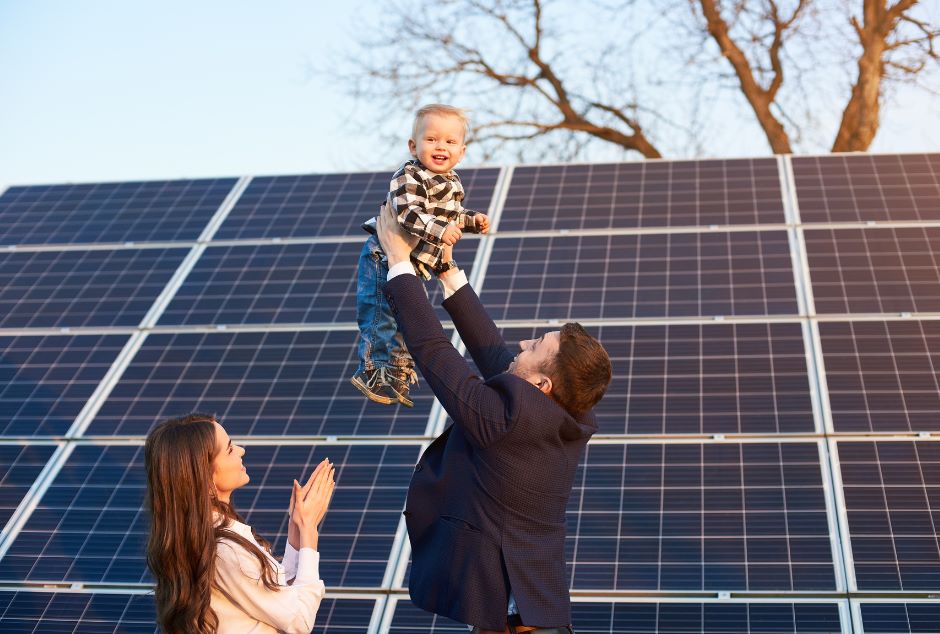
Recently, at a Washington DC sustainability fair, several moms came up to us and asked whether solar panels were safe for their families. We love having the opportunity to talk about this very good question. As parents ourselves, we understand the concern about any new technology in your home and any potential health effects! And we’ve got good news — solar panels are super safe and actually improve human health outcomes overall. Here’s how.
Electromagnetic Radiation from Solar Panels
One of the primary concerns people ask about is electromagnetic radiation emitted by solar panels. If you’re unfamiliar with the term, electromagnetic radiation is a kind of radiation with electric and magnetic fields (EMF) traveling in waves. It comes from both natural and man-made sources. Some examples of electromagnetic radiation include radio waves, microwaves, and visible light. For the purpose of this discussion, radio waves are the main type of EMF we’re exploring.
An extremely small and weak electromagnetic field is created whenever solar systems produce electricity and transmit it to the power grid. While this may sound ominous, the World Health Organization (WHO) reports that exposure to low-level electromagnetic fields has been studied extensively, with no evidence of any conclusive harm to human health.
A good way to think of this is by comparing these waves to EMFs emitted by cell phones. All cell phones emit EMFs, at low levels of non-ionizing radiation. If you’re comfortable carrying your phone in your pocket, then you will probably be comfortable with solar panels on your roof.

Safety First: No Harmful Emissions from Microinverters
Another question we hear is about EMFs from microinverters, smart meters, or power lines. Similar to solar panel-generated EMFs, WHO deems EMFs from smart meters, power lines, and microinverters safe. And these items are subject to FCC regulation.
At Uprise, we use Enphase microinverters, and like all electronic devices, they generate a small amount of EMFs. However, the levels produced by Enphase microinverters are well below international safety standards and are not considered harmful to human health. Numerous studies and independent testing have confirmed this.
In fact, like solar panel EMFs, radio frequency emissions from Enphase microinverters are significantly lower than those from common household devices like cell phones, Wi-Fi routers, and microwave ovens.
If you want to dig into this topic further, check out this white paper from the NC Clean Energy Technology Center: Health and Safety Impacts of Solar Photovoltaics.
Scientific Consensus on Solar Safety
The safety of solar technology isn’t just an industry claim. It’s backed by extensive research and the consensus of leading health organizations:
- WHO has concluded that low-frequency EMFs produced by solar equipment pose no known health risks.
- The International Commission on Non-Ionizing Radiation Protection sets EMF exposure guidelines, and solar technology falls well within these safe limits.
- The National Institute of Environmental Health Sciences has also conducted research on EMFs from power lines and electrical devices. They found no evidence of harm at the levels associated with solar panels and inverters.
Cancer Risks and Solar Energy
Concern about cancer from solar is understandable, especially for those watching a field of solar panels go up nearby. It makes sense that you might wonder about your family’s health with a large installation close to your home. But rest assured, more solar absolutely means healthier air, cleaner living, and a brighter future for everyone.
For decades, large-scale public health studies have concluded that there are no associations between solar energy and cancer. Global public health researchers have found in every study that solar panels do not cause cancer at any production level. This is true for rooftop installations and large solar farms.

In fact, solar energy adoption directly reduces health risks associated with traditional forms of energy production, such as pollution from toxic chemicals like sulfur dioxide, nitrogen oxides, particulate matter, carbon dioxide, mercury, and other hazardous air pollutants. These pollutants cause asthma, cancer, and other respiratory diseases.
All this doesn’t even take into account the health risks from climate change, which are truly terrifying. Long-term health risks from burning fossil fuels include respiratory and heart diseases, pest-related diseases like Lyme disease and West Nile virus, water- and food-related illnesses and scarcity, and injuries and deaths due to superstorms or wildfires. According to the US Department of Energy, climate change has also been linked to increases in violent crime and overall poor mental health.
Carbon Debt of Solar Panels vs. Fossil Fuels
With a warranty period of 25 years and an expected lifespan of 30+ years, the environmental payback for a single solar system is surprisingly quick. Even when considering transport, manufacturing, and installation, residential solar systems can offset their environmental impact and become carbon neutral in the first few years, with a net gain of nearly 50 pounds of carbon sequestered yearly.
Fossil-fueled energy sources obviously do the opposite, with an average of 14,020 pounds of carbon emitted per US household annually. The negative impact of burning fossil fuels compounds year after year, as we reach dangerous tipping points for ocean warming and wildfire mitigation.
Additional Health Benefits from Solar: At Home and On a Global Scale
Residential solar systems play a crucial role in creating decentralized power generation infrastructure. Distributed generation from individual solar owners means fossil fuel companies won’t need to build more infrastructure for peak demand times. Power can instead come from a network of solar owners, reducing heavy pollution in underserved communities where fossil fuel infrastructure, like peaker plants, are typically built.
Closer to home, your own energy resilience with solar and battery storage can lead to better health outcomes for your family. During blackouts and grid outages caused by extreme weather events, solar energy enables you to maintain your electricity supply. This ensures life-sustaining medical devices continue functioning, as well as the ability to maintain heating or cooling, water pumps, and other important appliances.

Widespread solar adoption in commercial and industrial settings and on a utility scale also offers immense benefits for human health. By replacing fossil fuel production with large-scale solar energy, we can significantly and quickly reduce emissions of airborne pollutants that pose serious health and climate risks. Decreasing the prevalence of respiratory infections, mitigating the risk of lung cancer, and improving overall air quality are among the many advantages of transitioning to solar.
By embracing solar power, we can build a healthier and more sustainable future for ourselves and future generations.
Uprise Solar’s Commitment to Safety
At Uprise, your safety is our top priority. We only install high-quality solar equipment that meets or exceeds all safety standards. We’re happy to answer any questions you have about solar technology and address any concerns about radiation or EMFs.
Please reach out to us with your questions! It’s important to discuss these issues and rely on scientific research to separate fact from fiction. At Uprise, we’re dedicated to providing reliable information and helping our customers make informed decisions about solar energy adoption. Reach out for a chat today at (202) 750-5718 or fill out the form on our site.
